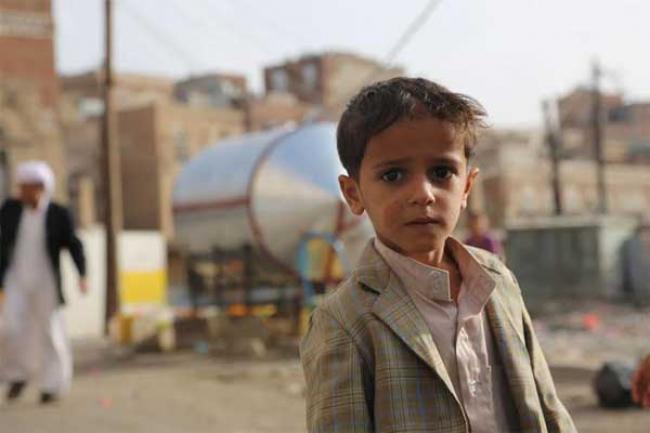Just Earth News 30 Mar 2016
#violence #loss #uncertainty #UNICEF #medical services #sporadic #electricity. political settlement.

OCHA/Charlotte Cans
The report, Children on the Brink, highlights the heavy toll that the violence in Yemen is having on children and the deterioration in an already precarious humanitarian situation.
UNICEF verified more than 1,560 incidents of grave violations again children in Yemen. As a result, more than 900 children were killed and more than 1,300 were injured in the past year alone. On average, at least six children have been killed or injured every day.
These numbers are almost seven times higher than the whole of 2014, the report notes. With more than 50 verified attacks on schools, children were also killed while attending school or on their way to or from school. These numbers represent the tip of the iceberg as they only indicate the cases that UNICEF was able to verify.
“Children are paying the highest price for a conflict not of their making,” UNICEF Country Representative Julien Harneis said in a press release. “They have been killed or maimed across the country and are no longer safe anywhere in Yemen. Even playing or sleeping has become dangerous.”
Recruitment of children in fighting
As the war escalates, the recruitment and use of children in the fighting continues to increase, the report warns. Children are taking up much more active roles in the fighting, such as manning checkpoints and carrying weapons. In the past year, UNICEF verified 848 cases of child recruitment; parties to the conflict have recruited children as young as 10 years old into the fighting.
The latest data shows that 63 health facilities have been attacked or damaged and most have reported severe shortages in medical equipment, supplies and personnel, along with sporadic electricity.
Deaths from lack of medical services
UNICEF also estimates that nearly 10,000 additional deaths from preventable diseases may have occurred among children under five years old in the past year as a result of the decline in critical health services including immunization and the treatment of diarrhoea and pneumonia. This figure is in addition to the nearly 40,000 children who die every year in Yemen before their fifth birthday.
Nearly 10 million children or 80 per cent of the country's total population of children are now in need of urgent humanitarian assistance. More than two million children face the threat of diarrhoeal diseases and 320,000 are at risk of severe acute malnutrition.
“We need to speed up the delivery of humanitarian assistance and continue to save lives as well as children's dreams of growing up and acquiring an education,” Harneis said. “It's a race against time.”
To date, UNICEF has received only 18 per cent of its $180 million funding requirements for 2016.
UNICEF reiterates its call on all parties to the conflict to put an end to the fighting in Yemen and reach a political settlement.
“Yemen was already a fragile state due to decades of underdevelopment and intermittent conflicts,” said Peter Salama, UNICEF's Regional Director for the Middle East and North Africa. “Sadly, children always bear the brunt. Without an end to the war, the country now risks becoming a failed state, with far-reaching and long-term consequences for children and their families.”